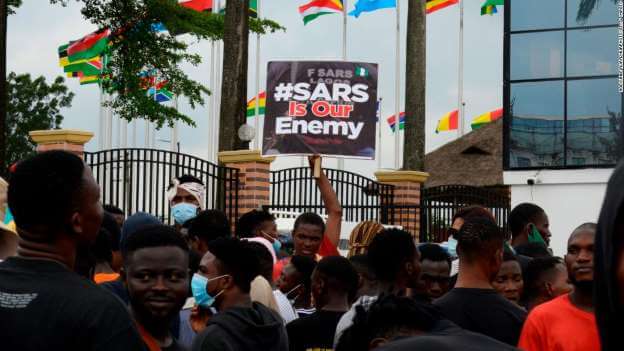
Nigeria dissolves controversial police unit accused of brutality
A controversial Nigerian police unit accused of brutality will be disbanded, following nationwide protests demanding an end to police violence in the country.
Nigeria’s Inspector General of Police announced that the Special Anti-Robbery Squad, known as SARS, will be dissolved, according to a police statement.
“IGP M.A Adamu … has today, 11th October, 2020, dissolved the Special Anti-Robbery Squad (SARS) across the 36 State Police Commands and the Federal Capital Territory (FCT),” a statement from police spokesman Frank Mba said.
All SARS officers are being redeployed with immediate effect, Mba added.
However, while the news was welcomed by jubilant protesters, they vowed to continue marching in their demands to end police brutality in all forms and make rogue officers accountable.
Before the decision to disband SARS was announced, one man died and several others were injured as police in Nigeria fired live ammunition and tear gas on young people protesting the unit.
The man has been named as Jimoh Isiaka and his death was confirmed by the governor of Oyo State, Seyi Makinde.

“I have received with deep sadness the news of the passing of one of our children, Jimoh Isiaka, who was shot during the ENDSARS protest in Ogbomoso,” Makinde said on Saturday. “He later died at Bowen University Teaching Hospital, Ogbomoso…” he added in the Twitter statement.
Five others were also injured in the state and taken to hospital, according to the governor.
Protesters in Nigeria’s capital Abuja also reported that police were using water cannons and firing live ammunition during a march on Sunday afternoon.
The nationwide protests were a culmination of weeks of anger and outcry online by the country’s young people over claims of kidnapping, harassment murder, and extortion by SARS.
The #EndSars hashtag has been trending worldwide since Friday and people in Nigeria have been using it to share videos and images of police using water cannons and tear gas to disperse protesters.
One woman who was at the Abuja march Saturday, where tear gas was also used, told CNN the protests were peaceful until police started firing at protesters.
Ndi Kato, 31, said: “No one threw anything or did anything wrong. No one was being belligerent, but the police kept threatening us.”
Solidarity protests took place Sunday in the United Kingdom, led by the actor John Boyega, and in Washington DC, in the United States. Both countries have large Nigerian immigrant populations.
Amnesty International said it has documented 82 cases of police brutality in Nigeria between 2017 and 2020.
People detained by SARS have suffered torture methods including hanging, mock execution and sexual violence, according to Amnesty.

